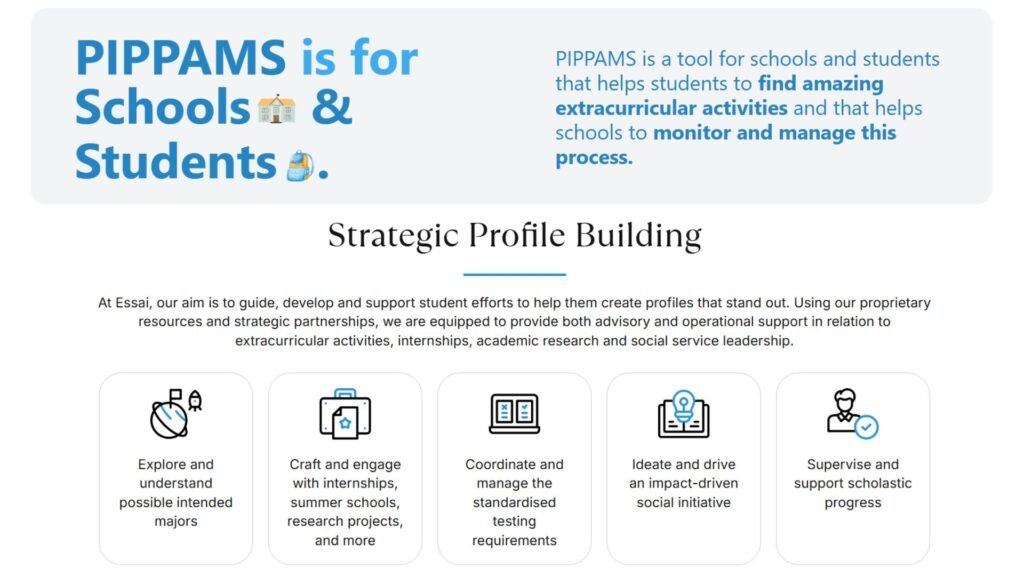When to Quit an Extracurricular? Have you ever wondered if stepping away from an activity could actually strengthen your Ivy League college application?
Will it signal weakness or show maturity? For many students aiming for top-tier admissions, understanding when to quit an extracurricular can make all the difference.
This guide examines how Ivy League schools perceive quitting activities and when doing so can enhance your application.
Throughout this journey, you’ll also see how Essai & PIPPAMS’s expert guidance can help you make these decisions confidently, ensuring your time and energy are invested where they matter most for your Ivy League dreams.
Understanding Ivy League Perspectives on Quitting
One of the biggest misconceptions students have is that quitting anything shows weakness. But Ivy League schools take a holistic approach. They look for:
- Depth over breadth: Long-term, meaningful involvement is better than shallow participation in 10 clubs.
- Consistency and growth: How have you developed in your roles?
- Authenticity: Are you doing something because you’re passionate about it, or are you just trying to pad your resume?
When you drop an activity because it no longer aligns with your personal or academic goals, it can demonstrate maturity, strategic thinking, and self-awareness.
Ivy League admissions officers respect students who can prioritize and make thoughtful decisions.
8 Clear Signs It’s Time to Quit
Knowing when to walk away is a skill. Here are key signals that it might be the right decision:
1. You Dread Every Session: If an activity emotionally and mentally drains you, it’s no longer contributing positively. Top colleges want to see genuine enthusiasm, not forced attendance.
2. It Conflicts with High-Priority Goals: Maybe you’re prepping for the SAT, managing AP classes, or building a nonprofit. If your time is better spent on these pursuits, it’s okay to reprioritize.
3. You’ve Outgrown the Activity: You joined a club as a freshman, but your interests have shifted. That’s natural. Admissions officers understand growth.
4. Minimal Impact on Your Story: If the activity doesn’t reinforce your narrative or career goals, it might be time to redirect that energy elsewhere.
5. Lack of Leadership or Growth Opportunities: If you’ve plateaued and there are no new challenges or roles to pursue, continuing might not add value.
6. It Hurts Your Academic Performance: Grades matter. If an extracurricular causes your GPA to slip, it’s likely not worth it.
7. It Affects Your Mental Health: Burnout is real. If you’re feeling overwhelmed or anxious, quitting can be a step toward achieving better balance and improved well-being.
8. You’re Only Doing It for College Apps: Admissions committees can sense inauthenticity. Don’t stay in something just because you think it “looks good.”
Will Quitting an Extracurricular Affect Your Ivy League Chances?
Many students worry that quitting an extracurricular will negatively impact their Ivy League application.
However, strategic quitting often strengthens your application rather than weakening it when approached thoughtfully and aligned with your goals.
Ivy League schools use a holistic admissions process, focusing on the quality, impact, and alignment of your activities rather than the sheer number you list.
They look for depth over breadth, valuing commitment, leadership, and authentic interests.
If an activity no longer serves your growth, quitting it to pursue something more meaningful can demonstrate maturity, self-awareness, and the ability to prioritize effectively.
Ivy League schools value quality of experience over quantity. Quitting can enhance your application if you:
- Use the extra time for internships, leadership roles, or independent research
- Show personal growth in your essays or interviews
- Align your time more closely with your academic and career aspirations
Important: You must be able to explain the decision. Frame it as a conscious shift to prioritize higher-impact opportunities.
Strategic Quitting vs Impulsive Quitting
Knowing when to quit an extracurricular can shape your Ivy League application positively, but only if you quit strategically rather than impulsively.
Strategic quitting is a thoughtful, planned decision made after evaluating how an activity aligns with your goals, interests, and overall narrative.
It involves reflection, consultation, and a clear plan for what you will pursue instead.
Impulsive quitting, on the other hand, is quitting in frustration or boredom without considering long-term impact, often leaving gaps in your activities and explanations.
Here is a detailed breakdown:
What is Strategic Extracurricular Quitting?
- You evaluate how the activity aligns with your academic and personal goals.
- You consider your current workload and mental well-being before making a decision.
- You explore whether there are growth opportunities left within the activity.
- You identify how quitting will allow you to pursue more impactful projects, research, or leadership roles.
- You plan how to communicate this decision in your essays or interviews, showing self-awareness and maturity.
- You quit respectfully, informing the club or activity leader and leaving on good terms.
What is Impulsive Extracurricular Quitting?
- You quit without reflecting on the reasons why you want to leave.
- You stop participating because you are temporarily overwhelmed or uninterested.
- You do not consider the potential impact on your narrative or application.
- You leave without a plan for how you will use the freed-up time.
- You do not communicate clearly with your team or mentor before leaving.
Before You Quit: 4 Things to Do
1. Reflect Ask: Does this activity align with who I am and where I’m going?
2. Talk to a Mentor: A trusted teacher, counselor, or advisor can offer objective guidance.
3. Plan Your Next Steps: Identify what you’ll do instead—something meaningful that adds to your narrative.
4. Prepare to Explain: Be ready to discuss this decision in essays or interviews. Make it a story of growth, not retreat.
Scenarios Where Quitting Boosts Your Profile
1. You Need to Focus on Academics: Grades are crucial. Quitting frees up time to excel in core subjects.
2. You Want to Deepen Your “Spike”: Top colleges love specialists. Quitting an unrelated activity helps you double down on what matters.
3. A New Opportunity Opens Up: Maybe you get offered an internship or research role. Leaving one thing to pursue another, a more impactful one, shows strategic thinking.
4. You’re Burned Out: Mental wellness is essential. Choosing balance shows maturity and self-care.
5. You’re Transitioning to Leadership Elsewhere: Quitting to accept a more aligned leadership position can elevate your application.
When Quitting an Extracurricular Can Strengthen Your Application?
Many students fear that quitting will harm their chances of admission to an Ivy League school, but it can often actually strengthen their application.
Ivy League and top-tier colleges value depth, focus, and authenticity over a lengthy list of activities undertaken solely for the sake of appearing busy.
Quitting an extracurricular that no longer aligns with your goals, interests, or intended major can free up valuable time and energy for pursuits that matter more to your growth and your application narrative.
Here is when quitting can be beneficial:
1. To Deepen Your “Spike”
Top colleges prefer students with a “spike”—an area of deep interest backed by achievements.
If an extracurricular does not align with your intended spike (like a minor club unrelated to your STEM or humanities focus), quitting can help you channel your efforts into research projects, competitions, or internships that strengthen your specialization.
2. To Focus on Academics
Strong grades are essential for Ivy League admissions. If an activity is causing your academic performance to decline, quitting can help you regain focus on your coursework while maintaining a healthy balance.
3. To Pursue Leadership Opportunities
If quitting a less impactful activity allows you to take on a leadership role in an area aligned with your goals, it shows initiative, commitment, and growth—all valued by admissions officers.
4. To Protect Your Mental Health
Burnout and stress from juggling too many commitments can harm both your well-being and your academic performance.
Quitting an extracurricular that is no longer serving you can help you maintain balance while focusing on fewer, more meaningful activities.
5. When Interests Change
Your interests may evolve during high school. If an activity you joined no longer aligns with your passions, quitting allows you to pursue new opportunities that reflect your current goals, making your application narrative more authentic.
6. To Make Space for Impactful Projects
Leaving an activity can open up time for projects such as starting a nonprofit, conducting original research, or creating an impactful community initiative.
These are experiences that can stand out in your Ivy League application more than passive participation in a minor club.
Quitting with Purpose
The key is to quit strategically, not impulsively. Before deciding to quit:
- Reflect on your goals and how the activity contributes to them.
- Consider what you will pursue with the freed-up time.
- Seek guidance from mentors or advisors, like the team at Essai & PIPPAMS to ensure it aligns with your narrative.
When framed correctly, quitting an extracurricular is not seen as an inconsistency but as a mature, strategic decision to prioritize growth and focus.
It signals to admissions officers that you know how to align your time with your goals—an essential skill for success in college and beyond.
Essai & PIPPAMS Can Help

We specialize in helping students build intentional, impactful narratives tailored for Ivy League and top-tier college admissions.
Whether you’re deciding how to quit extracurricular activities or looking to deepen your academic profile, we guide you through every step:
- Should you quit?
- What should you pursue instead?
- How can you frame it as a strength in your application?
We don’t just help you cut down—we help you level up.
And if you’re looking to track, manage, and elevate your extracurricular portfolio, we recommend using PIPPAMS—our trusted activity management platform.
PIPPAMS helps students and schools document involvement, assess strengths, and identify gaps in real time, so you can make smarter decisions about what to keep, drop, or add to strengthen your overall application narrative.
Essai + PIPPAMS = strategic clarity + streamlined execution.
Together, we help you not only do more with your time—but make it matter more.
Conclusion
It’s not about doing less. It’s about doing what matters more.
Quitting an extracurricular can reflect strength, not weakness—if it’s aligned with your academic and personal goals.
With the proper guidance, you can make quitting part of a bigger, bolder story. At Essai & PIPPAMS, we help you write that story—one decision at a time.
FAQs
Q. Will quitting an extracurricular hurt my Ivy League chances?
A: Not if you do it strategically. Ivy League schools value depth and authenticity over quantity. If you quit an activity that no longer serves your goals and redirect your time toward meaningful pursuits, it can strengthen your application.
Q. What do Ivy League schools prefer—breadth or depth in extracurriculars?
A: Depth. Admissions officers want to see commitment, impact, and leadership in a few well-aligned activities rather than surface-level involvement in many.


